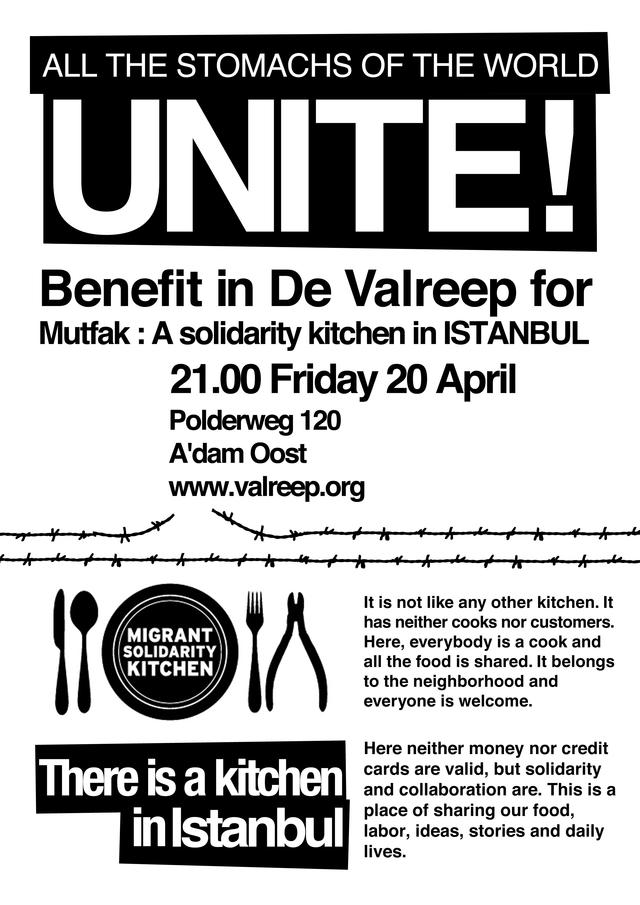

(A'dam)Benefit: Mutfak, A solidarity Kitchen in Istanbul, April 20@Valreep@9pm
Waar: Op de Valreep, Polderweg 120, Amsterdam, Netherlands (GPS lat: 52.358214 lon: 4.934856)
Wanneer: 17/04/2012 - 13:37 t/m 30/04/2012 - 13:37
Benefit and Info Evening
Mutfak: A Solidarity Kitchen in Istanbul
All the Stomachs of the World Unite!!

Time to show solidarity for Mutfak, a solidarity kitchen in Istanbul, that is striving to fight against sociospatial injustices!!
Friday 20 April, 21.00
@de Valreep, Polderweg 120 Amsterdam
There will be short movies, delicious snacks&drinks and of course live music!
(Flyer attached and more info below)
The Migrant Solidarity Network (İstanbul)
Active since September 2009, The Migrant Solidarity Network (MSN) is a horizontally organized, Istanbul-based activist network. The network considers itself as part of the transnational and internationalist movement of "no border" and defends that everyone has the right to unconditional freedom of movement and the right to dwell wherever they choose. The motto of MSN is that it is not human beings who are unlawful; it is only borders and the institutions that establish and maintain those borders that are illegitimate; and that the rights such as the right to residence, work, health, and education are rights to which everyone is entitled regardless of their citizenship and regardless of whether they are “documented.”
"The Kitchen Project" MSN wishes to create a space for the close interaction of the members of the initiative with the migrant groups. This space is intended to have the form of a kitchen where the migrants and local activist will come together for cooking and eating food.The area we chose for the kitchen is Tarlabasi. Populated by the Armenian and Greeks a century ago, Tarlabasi is now inhabited by the Roma, internally displaced Kurds, refugees from Iraq and undocumented African migrants. Besides, along with more than 50 other Istanbul neighborhoods, Tarlabasi is included in the so-called “Urban Transformation Project” (gentrification). The kitchen project, we believe, will serve not only to grow stronger ties between activist groups and the migrants themselves, but also to provide a platform for developing grassroots resistance to displacement. Some of the neighborhoods where the gentrification project is introduced, showed solidarity, organized local protests and resisted neoliberal urban policies, whereas the others, lacking a platform for self-organization, were swept away. Learning from these experiences of grassroots resistance in the other neighborhoods, the kitchen project, intends to open a space of solidarity where different groups can build alliance against the deleterious effects of the gentrification projects.
